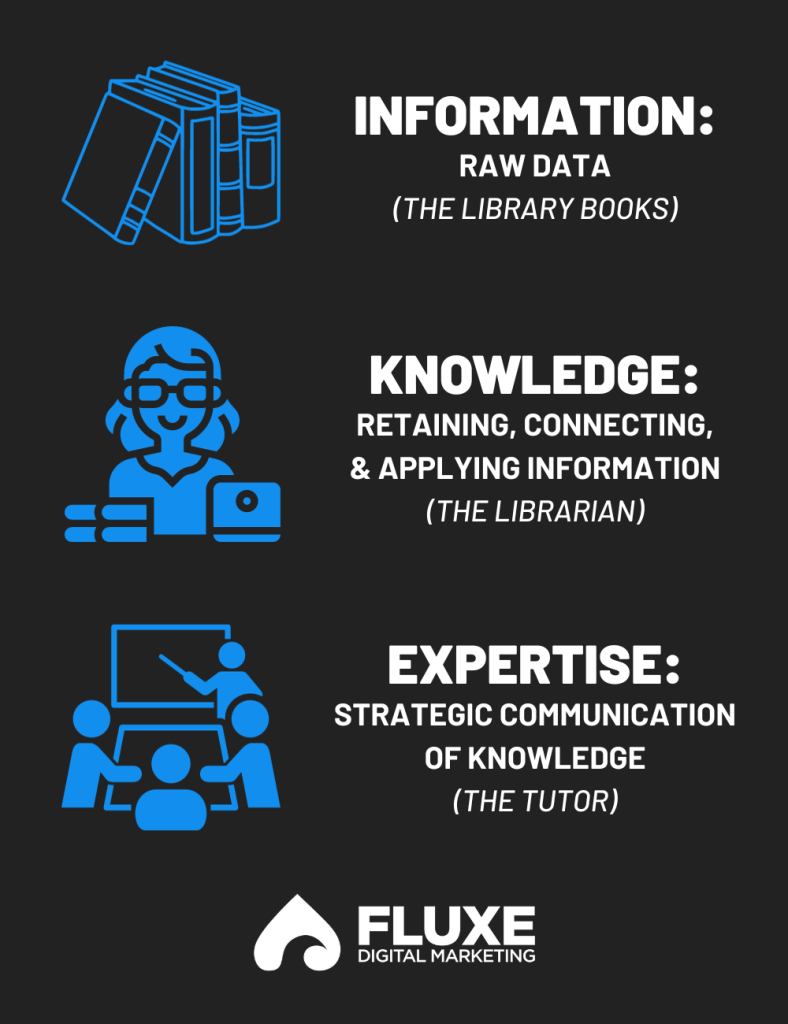How many times a day do you repeat yourself? If you’re a business leader, probably often.
Whether it’s the explanation of a concept, an instruction, or an action others need to take, you find yourself explaining the same thing over and over to the same people.
No, you’re not stuck in Groundhog Day. So why aren’t clients and prospects retaining your message?
Here’s the secret: It isn’t because of a lack of knowledge on your part, and it isn’t because everyone else is slow.
We can sum up the real problem in one seemingly innocuous word: communication.
Here’s why, and how to correct the issue.
Know the Signs
Many frustrated business leaders rehash the same concepts repeatedly in:
Yet despite all their efforts, the message still isn’t landing.
How can you identify when your communication of knowledge isn’t resonating with your audience? Repeated questions are one dead giveaway, as are confused looks on clients’ faces. Some more objective measures include:
- Low engagement
- Unsuccessful sales calls
- Website metrics trending down
- Lack of referrals
- Low attendance at in-person or virtual events
The problem here lies not in a lack of knowledge but in a failure to communicate that knowledge effectively. You probably know as much as all the other “experts” in your field, but unless you can communicate that knowledge to your audience in a way they can grasp, you won’t be a true “expert” in their eyes.

Information vs. Knowledge vs. Expertise
Before we go on, let’s define what exactly we mean when we discuss information, knowledge, and expertise.
Information is raw data. Anyone can access this data with the right means. Think of it like the books in a library. Everyone has a library card. (Or, 10 years ago, they did. Last year, it was called Google. This year, it’s called ChatGPT.) The barrier to accessing information is lower than it’s ever been.
Knowledge is retaining, connecting, and applying information. To continue our metaphor, knowledge is the librarian. Say you need to write some effective headlines. The librarian knows exactly which books to reference for the situation and where those books are shelved.
Expertise is the strategic communication of knowledge. An expert tailors their insights to a specific audience and situation, like a tutor translating complex ideas into “aha moments” for a student based on how that student learns best.
By this measure, “expert” isn’t a title anyone can bestow on themselves. It’s a title earned by sharing your knowledge with others in a way they can receive it.
Consider two doctors with the same medical knowledge from years of training. One rattles off complex terminology during quick patient visits; the other explains conditions clearly and compassionately in plain language. Though both doctors share the same information, patients see the second as the expert because her knowledge resonates meaningfully.
The bottom line? We can’t claim expertise just because we know a lot. Expertise hinges on communicating knowledge effectively so that it sinks in.

Transform Knowledge Into Expertise
You don’t want your audience to see you as the librarian who dumps three tons of impenetrable data on them at once and speaks in terms they don’t understand. You want them to see you as their tutor, as the guide who tells them what they need to know and helps them understand and apply it.
This is the way brands can win in a world of AI and overcrowded content. It’s not about learning more. It’s about communicating your knowledge to your audience at the RIGHT time in the RIGHT medium in the RIGHT way.
Here’s how you earn your “expert” designation:
Step 1: Take Inventory
Identify your audience’s common questions and pain points. Review sales calls and emails to spot where communication breaks down. Ask your staff what questions they hear from prospects and clients most frequently.
Step 2: Translate Your Knowledge
Translate your knowledge into lightbulb moments for your audience. Find ways to make the information stick through concrete examples, stories, analogies, and visuals tailored to their perspective. Meet them where they are.
Don’t rely on technical jargon. If your audience is moms in their late 30s, explain concepts through analogies to situations parents face daily and references to TV shows that elder millennials love.
This process takes a healthy amount of trial and error. Document the approaches that work, trim those that flop, and don’t give up easily.
Step 3: Adapt Your Message to Different Mediums
What medium best communicates your expertise to your audience? Is it:
A. Written
B. Audio
C. Visual
D. All the above
If you picked D, you’re correct.
Repeating the same message across different mediums may feel redundant, but a good concept doesn’t reach its potential in only one format. It’s adaptable to every medium — from a blog post to a presentation slide to a podcast interview question.
Give your audience as many opportunities as possible to consume and understand your message in a medium that resonates with them.
Step 4: Publish Regularly
Make a content calendar and stick to it. If not, other tasks will hoard your attention, and you’ll drop off for months on end.Nothing kills momentum — and an audience’s attention — like inconsistency.
Step 5: Eat Feedback for Breakfast
Just because you think you’ve found the perfect way to say something doesn’t mean you’re right.
Test different approaches. Press your clients and audience for constructive feedback. Iterate and improve. And be willing to kill your darlings.
When it comes to content marketing, nothing is sacred but trial and error.
Stand Out by Connecting the Dots
Information isn’t scarce — anyone with internet access can ask Google a question. Knowledge itself isn’t scarce, either. But the ability to meaningfully synthesize and tailor knowledge is rare and valuable.
Refine this craft to distinguish yourself as an expert — one who transforms information into “aha” insights and answers that meet your audience where they are.
When you make the complex simple, you build understanding and momentum. As you master the art of translating knowledge into resonance, your ideal prospects will take notice.
That’s true expertise.
If you need help translating your knowledge and capturing your ideal prospects’ attention, our team of content marketing experts is standing by. Reach out. We’re excited to get to know you.



